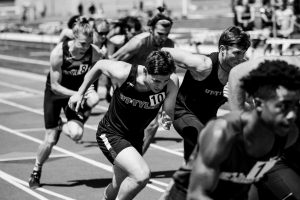
It’s important to recognize when a client’s mind is preventing him or her from moving forward.
Sometimes a client or athlete stops progressing not because of a physical limitation or plateau but because of a mental barrier. The human mind is a powerful machine; the way a person thinks has the capability to positively or negatively impact goal achievement. But how does a personal trainer know what to do or who to call upon for guidance?
Enter in – sport psychology.
History of Sport Psychology
The roots of sport psychology research date back to the late 19th century (Joyce & Baker, 2008). At this time, Norman Triplett discovered that cyclists who rode with others experienced enhanced performance.
It wasn’t until 1938 when the owner of the Chicago Cubs hired an experimental psychologist from the University of Illinois by the name of Coleman Griffith that sport psych was credited with a “founding father” (Green, 2012).
Griffith was hired to give the Cubs a “psychological advantage”. However, his recommendations were often met with resistance and mockery by the team’s coaching staff. He, all while butting heads with the staff, worked with the team until 1940 marking the end of sport psychology’s initial appearance in the pro sports arena.
Interestingly, 30 years later professors Kroll and Lewis revisited Griffith’s work and declared him to be “America’s First Sport Psychologist” (Green, 2012). Today, the Association for the Advancement of Applied Sport Psychology dedicates an award to Griffith and his work (Green, 2012).
Continued research in the field revealed that the mind (the psychology of how we think and act) can either help or hinder sports performance independent of physical strength or skill. In short, it’s possible for athletes to “psyche themselves up or out”.
Sport Psychology Defined
According to the American Psychological Association (APA), sport psychology is“a proficiency that uses psychological knowledge and skills to address optimal performance and well-being of athletes, developmental and social aspects of sports participation and systemic issues associated with sports settings and organizations” (apa.org).
Sport psychology covers a wide range of areas, issues, and topics that impact the athlete and athletic team as a whole.
What Sport Psychologists Do
Sport psychologists work with individual athletes but also work in group settings and with members of the coaching staff. The role of a sport psychologist is to assist athletes and teams in removing barriers preventing them from achieving an optimal level of performance on the field or court.
The core skills and procedures this professional field uses are cognitive and behavioral skills training for performance enhancement, counseling interventions, and consultation training (apa.org).
Topics addressed include goal setting, guided imagery, leadership skills, emotion management, athletic injury and return to competition, eating disorder treatment and management, career transitions, team building, sportsmanship skills, and motivation.
The Mind-Body Connection
The psychological benefits of exercise have long been documented. We know exercise helps in reducing symptoms of depression, enhances mood, improves self-esteem, and reduces stress (AASP). It isn’t farfetched that the reverse is true: psychology affects performance.
There’s ultimate power in positive thinking, guided imagery, teambuilding and all other tools sport psychologists employ. If you are a personal trainer who works with athletes (of all ages and competition levels), a sport psychologist is a valuable professional to add to your network.
While personal trainers do have the ability to apply motivational interviewing and guided imagery techniques, it is outside their scope to counsel or apply sophisticated psychological techniques aimed at improving performance, diagnosing a suspected eating disorder, mentally preparing an athlete to return to competition after an injury, etc.
With that said, fitness professionals are encouraged to sharpen their knowledge about the relationship between the mind and the body and that relationship’s ability to influence mental health and physical performance.
To learn more about this field of study, visit the following sites.
Association for Applied Sport Psychology
American Psychological Association
Joyce, N., & Baker, D. (2008). The early days of psychology. Monitor on Psychology, 39(7), p. 28.
Green, C.D. (2012). America’s first psychologist. Monitor on Psychology, 43(4), p. 22.
Dr. Erin Nitschke, NFPT-CPT, NSCA-CPT, ACE Health Coach, Fitness Nutrition Specialist, Therapeutic Exercise Specialist, and Pn1 is a health and human performance college professor, fitness blogger, mother, and passionate fitness professional. She has over 15 years of experience in the fitness industry and college instruction. Erin believes in the power of a holistic approach to healthy living. She loves encouraging her clients and students to develop body harmony by teaching focused skill development and lifestyle balance. Erin is also the Director of Educational Partnerships & Programs for the NFPT. Erin is an editorial author for ACE, IDEA, The Sheridan Press, and the Casper Star Tribune. Visit her personal blog at belivestaywell.com

